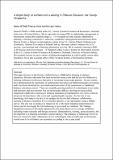| dc.contributor.author | O'Neill, Susan | en |
| dc.contributor.author | Scott, Murray | en |
| dc.contributor.author | Conboy, Kieran | en |
| dc.date.accessioned | 2011-01-14T17:03:57Z | en |
| dc.date.available | 2011-01-14T17:03:57Z | en |
| dc.date.issued | 2010-09-21 | en |
| dc.identifier.citation | O'Neill, S., Scott, M., & Conboy, K. A Delphi study on collaborative learning in distance education: The faculty perspective. British Journal of Educational Technology, [early view article](in press). | en |
| dc.identifier.issn | 0007-1013 | en |
| dc.identifier.uri | http://hdl.handle.net/10379/1538 | en |
| dc.description.abstract | This paper focuses on the factors which influence collaborative learning in distance
education. Distance education has been around for many years and the use of collaborative
learning techniques in distance education is becoming increasingly popular. Several studies
have demonstrated the superiority of collaborative learning over traditional modes of learning
and it has been identified as a potential solution to some of the weaknesses of traditional
distance education courses. There are a rapidly growing number of technologies in use today
and educators and practitioners face an increasingly difficult challenge to successfully
implement collaborative learning in distance education; precipitated not only from technical
advances but also from wider social and organisational concerns. To the best of our
knowledge, this study is the first to investigate the factors that influence collaborative
learning in distance education, by eliciting the opinions of an expert panel using a Delphi
survey. The aim was to produce an integrated list of the most important implementation
factors and to investigate the role technology is perceived to contribute. The findings
identified seventeen of the most important factors; these factors cover a range of themes
including course rationale and design, instructor characteristics, training, group dynamics, the
development of a learning community and technology. The potential of technology however
does not seem to be fully realised and newer technologies such as multi-user environments
would seem to be of limited use in practice according to the expert panel. | en |
| dc.format | application/pdf | en |
| dc.language.iso | en | en |
| dc.publisher | Wiley-Blackwell | en |
| dc.rights | Attribution-NonCommercial-NoDerivs 3.0 Ireland | |
| dc.rights.uri | https://creativecommons.org/licenses/by-nc-nd/3.0/ie/ | |
| dc.subject | Collaborative learning | en |
| dc.subject | Distance education | en |
| dc.subject | Enterprise Agility | en |
| dc.title | A Delphi study on collaborative learning in distance education: The faculty perspective | en |
| dc.type | Article | en |
| dc.local.publishedsource | http://dx.doi.org/10.1111/j.1467-8535.2010.01132.x | en |
| dc.description.peer-reviewed | peer-reviewed | en |
| nui.item.downloads | 1067 | |


